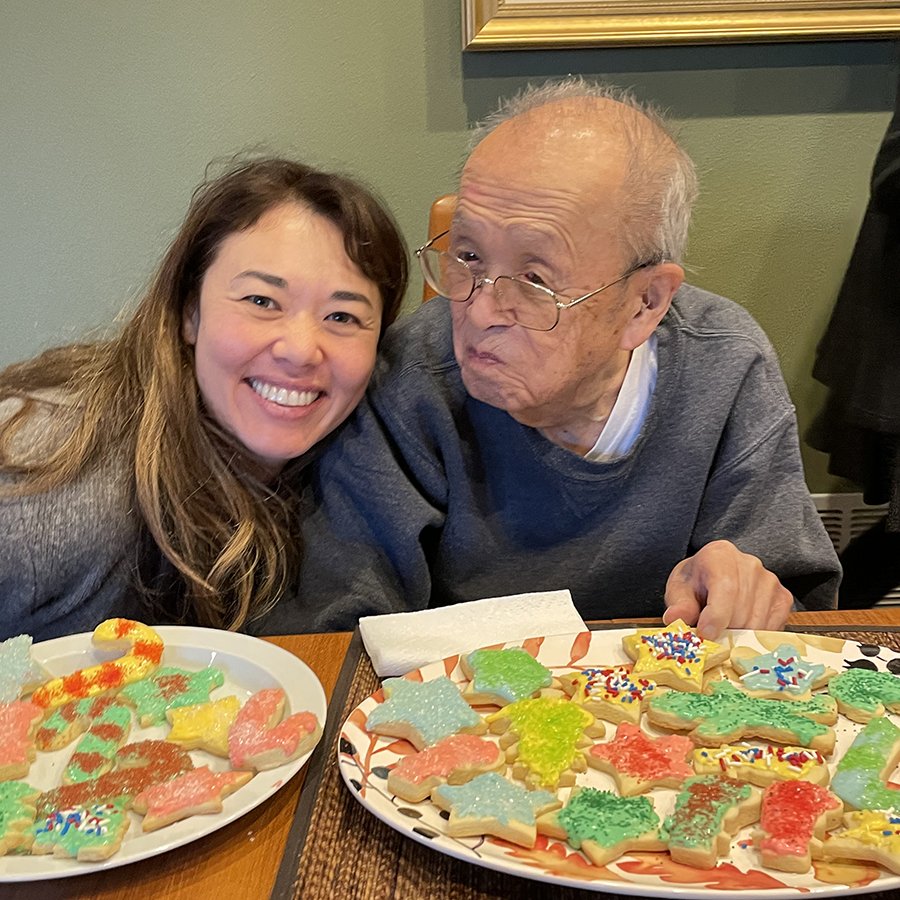I’m often asked why I came to SVP. My background is in transportation planning and policy, and I was living in Washington DC when I accepted the job. But the answer is simple – I wanted to join a community that embraced the power of giving to advance racial justice and equity.
My personal experiences have made me an advocate for why SVP’s approach is needed. In some ways, all of our individual pasts have a way of “speaking” into the present day – and collectively our past has a lot to teach about why our society’s challenges exist.
My grandfather, a proud man with a buzz cut and firm hug, lost everything during World War II. At 16, he and his family were interned by the US government because they were Japanese American. They were forced out of their home on First Hill and made to give up the small business they owned. My grandfather, who started high-school at Garfield, graduated surrounded by barbed wire in Idaho. For three years, he lived at the Minidoka Internment Camp, his only crime being born of Japanese descent.

After the war, my grandfather strived to be a model American. He joined the U.S. Army and later worked for Boeing. However, when he and my grandmother, with two young children, tried to buy their first house he was excluded from buying in neighborhoods like Capitol Hill because of racist practices. My grandparents purchased their first home in Skyway and spent their lives working to build a future for their family. However, they stopped speaking Japanese and named their children American names – Arlene and Shirley. Raised Buddhist, my grandfather sent my mother and aunt alone to a neighborhood Christian church. He and my grandmother urged them to fit in. They wanted to protect and insulate their children from the racism and trauma he experienced that damaged his family’s social and financial stability.
When I was born, my parents wanted the opposite experience for me – they wanted me to feel connected to the Japanese American community. They named me Emiko and joined Blaine Memorial United Methodist Church, a predominantly Japanese American church located at the end of a one-way street on Beacon Hill. I grew up surrounded by four generations of Japanese American – the Issei, Nisei, Sansei, and me, Yonsei.
Every Sunday, I put on a cotton dress and buckled Mary Janes and headed to Blaine to listen to stories in Sunday School and fidget with the thin and slippery paper of the hymn book in services. And then, at the end of service, we would pass wicker baskets down the aisles for the weekly collection. My parents would hand me crisp bills and I would beam as I placed the money into the growing pile we used to support the church.
After service, we would head to the social hall where would we break bread – my favorite being the layered Hawaiian Jello, with each rainbow color separated by jellied sweeten condensed milk. And it was over coffee and Jello that the adults of the church would plan how we, as a community, could share our time, talent, treasure, and ties, with our larger community. We planned food banks and volunteer days, where the whole church gathered to give our time and talent.
This isn’t a story about church, though. My mother is quick to remind me I haven’t set foot in church, save for a wedding or funeral, in over two decades. What sticks is my memory of a community, who, despite the racism they experienced, and perhaps because of that racism, practiced the generosity of giving.
This month, I shared with SVP’s Board of Directors that my desire for the next two years is to focus SVP’s work on eliminating racial economic inequality.
The racial wealth gap exists because of centuries of policies, systems, and institutions practices – including philanthropic systems – that systemically denied people of color, especially Black people, wealth. The gap directly contributes to other vast inequities in this country that show up everywhere in our building blocks of our lives, including – health, education, and housing.
Addressing this damage and inequity should be done collectively, but we all have an individual contribution to make, just as those parishioners in my childhood church did at the collection basket and the volunteer group. I find a lot of hope in thinking about an undeniable fact: just as the roots of wealth inequality were built story by individual story, and are now part of our society, we all can contribute to solutions and then work to bring our collective approach into the mainstream.
At SVP, because of our unique philanthropic model, we have an opportunity to organize, to reimagine, and advocate to eliminate the racial wealth gap. Together, we can educate ourselves and our communities on the root causes of wealth inequality and the opportunities to close the racial wealth gap through systems change. We can organize ourselves and other philanthropists to advocate for policies that eliminate the racial wealth gap. And we use our time and talent collaborate with BIPOC led and serving organizations to build their power.
My grandmother passed away in 2020, and my grandfather, last January. Since then I’ve thought about how I can remember and celebrate the gifts they gave me – the values of family, generosity, and justice. I recently made a donation to my childhood church that was a quiet celebration of them, and of the power of community to lift us all up. Their spirit animates my life, and my giving, every day.
